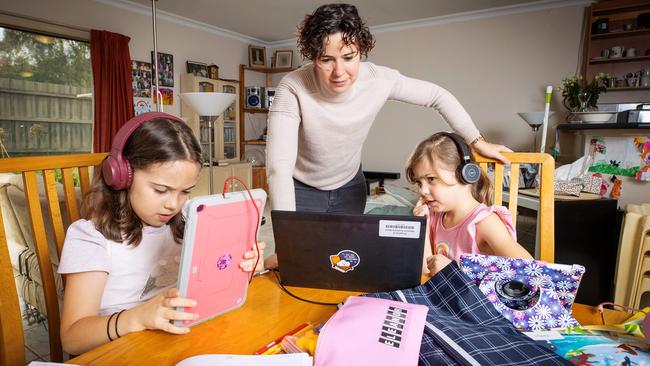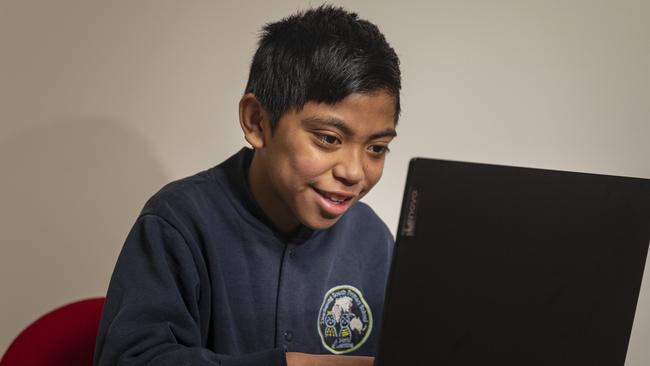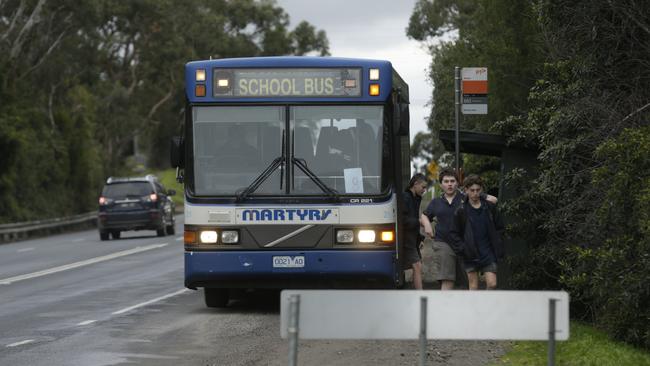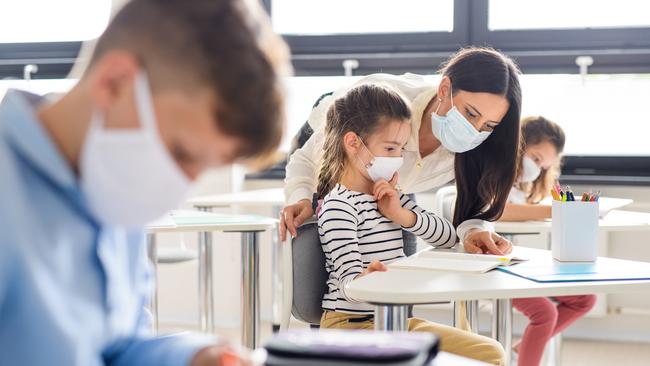Home schooling Melbourne lockdown: Parents guide to home teaching
Remote learning kicks off again, with most parents also juggling working from home. Here’s everything you need to know.
Education
Don't miss out on the headlines from Education. Followed categories will be added to My News.
The dreaded double-act of working at home while supervising home schooling will start for most parents on Monday.
Students will only be able to study on campus if both of their parents are authorised essential workers who cannot work from home.
This will mean many teachers who are parents will have to work at home educating students online and supervise their own kids’ learning as well.
Single parents who do essential jobs must work outside of the home for their kids to be eligible for on-campus study, Department of Education guidelines show.
The rules note that students will only be admitted on school sites if no other supervision arrangements can be made.

Vulnerable children are also allowed to attend school from Monday to Thursday.
Next week students will enter their second bout of home schooling this year, on top of 21 weeks last year of missed face-to-face learning in classrooms.
Last year as lockdown wore on and parents became more stressed or ran out of leave, more children were allowed on site. The number of kids on campuses reached up to 25 per cent at some schools.
Parents with preschool-aged children will be able to send their children to childcare as normal next week.
Parents Victoria executive officer Gail McHardy said parents should do the best with what they can during lockdown number four.
“Every household is different, no one’s situation is exactly the same and there will be families under extreme stress be it financial and emotional,” she said.
“Remember students learn in many ways and reflect on the creative ways we all used in 2020 to change it up and maintain positivity.”
Acting Premier James Merlino said it was important for parents and carers “to trust your school and your child’s teacher”.
“They did a brilliant job last year and earlier this year they will do a brilliant job again,” he said.
WHO CAN SEND THEIR KIDS TO SCHOOL FOR ONLINE LEARNING?
Students will only be able to study on campus if both of their parents are authorised essential workers who cannot work from home.
Single parents who do essential jobs must work outside of the home for their kids to be eligible for on-campus study,
Students will only be admitted on school sites if no other supervision arrangements can be made.
Vulnerable children are also allowed to attend school, but they must fit into an approved category.
BOARDING SCHOOLS
Boarding schools will stay open but will move to remote learning.
SCHOOL CAMPS AND EXCURSIONS
Students already on camps may choose to return earlier than expected but are not required to do so. Camps and excursions may not start during lockdown.
BORDER SCHOOLS
Only staff and students who are enrolled in or work in a school in a bordering state will be able to attend on site if they meet DET guidelines.
WHAT WILL HAPPEN AT SCHOOLS?
The learning program delivered on-site will be the same as the classes delivered to students undertaking remote learning.
Students attending on site will be supervised by staff on site but follow the teaching and learning program provided by their classroom teacher.
Students receiving on site supervision can participate in outdoor, non-contact physical activity. Singing, group activities and playing brass or woodwind instruments must be postponed or occur remotely. Libraries will be closed.

TEACHERS
Where teachers and support staff are not required on site, they must work from home.
School leaders are expected to be on site. Schools will call for volunteers first for those to be on site. Those who are needed to be on site can send their kids to school, but only if no other arrangements can be made. Those who are working from home cannot send their kids to school.
CHILDCARE, EARLY LEARNING AND FAMILY DAY CARE
Open as usual.
COMPUTERS FOR HOME LEARNING
Where necessary, students should be provided with digital devices to enable access to learning programs being provided by the school.
OUTSIDE SCHOOL HOURS CARE PROGRAMS
Outside School Hours Care programs can continue to operate for students eligible for on-site supervision.
SCHOOL FACILITIES
Playgrounds remain open for school use and can be made available for community use out of school hours. School pools are closed and community groups cannot use school facilities except for playgrounds.
VISITORS TO SCHOOLS
No school tours, meetings, gatherings, assemblies or events.

SCHOOL BUSES
School bus services across the state will continue to operate as normal.
VET AND VCAL
VET and VCAL classes must operate remotely.
Covid SAFE PRACTICES
All staff and students at schools should undertake regular hand hygiene. Sharing of food is not permitted. No shaking hands, hugging or kissing. Physical distancing should be followed where possible.

FACE MASKS
School staff and secondary school students aged 12 or older must always wear a face mask at school unless a lawful exception applies.
Children under 12 years of age and students at primary school are not required to wear face masks when at school.
For communication purposes, teachers and education support staff are not required to wear face masks while teaching, but those who wish to do so, can.
Face masks are mandatory for all school staff and school students aged 12 or older when travelling to and from school on public transport and when in taxis or ride share vehicles.
TEMPERATURE CHECKS
No.
Source: Department of Education




